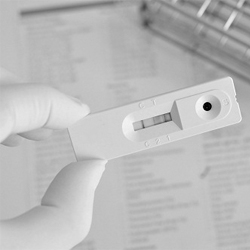TruQuick™ HIV 1,2,O
HIV (Human Immunodeficiency Virus) is the etiologic agent of Acquired Immune Deficiency Syndrome (AIDS). The virion is surrounded by a lipid envelope that is derived from the host cell membrane. Several viral glycoproteins are on the envelope. Each virus contains two copies of positive-sense genomic RNAs. HIV-1 has been isolated from patients with AIDS and AIDS-related complex, and from healthy people with high potential risk for developing AIDS.1 HIV-1 consists of Subtype M and Subtype O. Highly divergent strains of HIV-1 were first recognized in 1990 and grouped provisionally as Subtype O as this variation has similar glycoprotein markers to HIV-1 but a slight variation to the protein marker. Although rarely compared to HIV-1 and HIV-2, infections caused by Subtype O have so far been identified in Africa (Cameroon), France and Germany. HIV- 2 has been isolated from West African AIDS patients and from seropositive asymptomatic individuals.2 HIV-1, HIV-2, and Subtype O all elicit immune responses.3 Detection of HIV antibodies in serum, plasma or whole blood is the most efficient and common way to determine whether an individual has been exposed to HIV and to screen blood and blood products for HIV.4 Despite the differences in their biological characters, serological activities and genome sequences, HIV-1, HIV- 2, and Subtype O show strong antigenic cross-reactivity.5, 6 Most HIV-2 positive sera can be identified by using HIV-1 based serological tests. TruQuick HIV 1,2,O is a rapid test to qualitatively detect the presence of antibodies to HIV type 1, type 2, and/or Subtype O in whole blood, serum or plasma specimen.
- Bring the pouch to room temperature before opening it. Remove the Test Cassette from the sealed pouch and use it as soon as possible.
- Place the cassette on a clean and level surface.
- For Serum or Plasma specimen: Hold the dropper vertically and transfer 1 drop of serum or plasma (approximately 25 μL) to the specimen area, then add 1 drop of Buffer (approximately 40 μL),and start the timer, see illustration below.
- For Venipuncture Whole Blood specimen: Hold the dropper vertically and transfer 2 drops of whole blood (approximately 50 μL) to the specimen area, then add 2 drops of Buffer (approximately 80 μL), and start the timer. See illustration below.
- For Fingerstick Whole Blood specimen:
- To use a capillary tube: Fill the capillary tube and transfer approximately 50 μL of fingerstick whole blood specimen to the specimen area of test cassette, then add 2 drops of Buffer (approximately 80 μL) and start the timer. See illustration below.
- To use hanging drops: Allow 2 hanging drops of fingerstick whole blood specimen (approximately 50 μL) to fall into the specimen area of test cassette, then add 2 drop of Buffer (approximately 80 μL) and start the timer. See illustration below.
- Wait for the colored line(s) to appear. Read results at 10 minutes. Do not interpret the result after 20 minutes.
- Chang SY, Bowman BH, Weiss JB, Garcia RE, White TJ. The origin of HIV-1 isolate HTLVIIIB. Nature 1993;3;363:466-9.
- Arya SK, Beaver B, Jagodzinski L, Ensoli B, Kanki PJ, Albert J, et al. New human and simian HIV-related retroviruses possess functional transactivator (tat) gene. Nature 1987;328:548- 550.
- Caetano JA. Immunologic aspects of HIV infection. Acta Med Port 1991;4 Suppl 1:52S-58S.
- Janssen RS, Satten GA, Stramer SL, Rawal BD, O’Brien TR, Weiblen BJ, et al. New testing strategy to detect early HIV-1 infection for use in incidence estimates and for clinical and prevention purposes. JAMA 1998;280(1): 42-48.
- Travers K, Mboup S, Marlink R, Gueye-Nidaye A, Siby T, Thior I, et al. Natural protection against HIV-1 infection provided by HIV-2. Science 1995;268:1612-1615.
- Greenberg AE, Wiktor SZ, DeCock KM, Smith P, Jaffe HW, Dondero TJ, Jr. HIV-2 and natural protection against HIV-1 infection. Science 1996;272:1959-1960.

